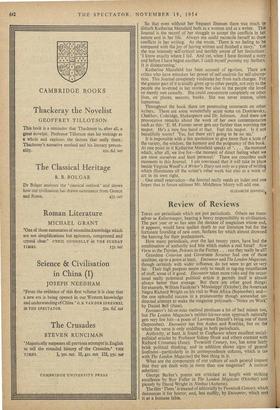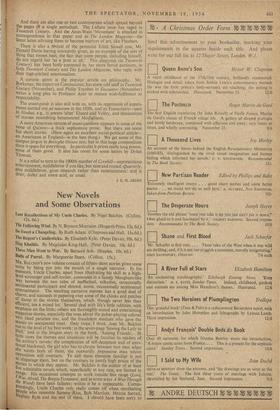Review of Reviews THERE are periodicals which are just periodicals.
Others see them- selves as Kulturtraeger, bearing a heavy responsibility to civilisation. The past year or so has seen the decease of magazines whose end, it appears, would have spelled death to our literature but for the fortunate founding of new ones, fanfares for which almost drowned the keening for their predecessors. How many periodicals, over the last twenty years, have had the combination of authority and bite which makes a real force? New Verse in the Thirties, Polemic in the Forties . . . can they really be all?
Grandma Criterion and Governess Scrutiny had one of these qualities, up to a point at least. Encounter and The London Magazine, though certainly with wider influence, do not seem to get us very far. Their high purpose seems only to result in rag-tag miscellanies of stuff, some of it good. Encounter takes more risks and the occas- ional really polemical political article it permits itself is almost always better than average. But there are other good things: for example, William Faulkner's 'Mississippi' (October), the American Negro Richard Wright on his visit to West Africa (September), and— the one splendid success in a praiseworthy though somewhat un- directed attempt to make the magazine polymath—'Notes on Work' by Daniel Bell (June). Encounter's hit-or-miss method produces a lot of bad misses too, but The London Magazine's neither-hit-nor-miss approach naturally gets very few hits—a poem of Lawrence Durrell's being one of them (September). Encounter has fine Auden and Roethke, but on the whole the verse is only middling in both periodicals. Authority, at least, is found in Co,f!uence where excellent social- political articles by Professor Sidney Hook and others contrast with Richard Crossman (June). Twentieth Century, too, has some fairly brisk political thinking, and in addition shows signs of general liveliness—particularly in its correspondence column, which is (as with The London Magazine) the best thing in it. - There is also a revival of the perennial Edith Sitwell row, Mr. Donald Davie having innocently given, as an example of the sort of thing that rouses heat, the fact that some people, including himself, do not regard her 'as a poet at all.' This diagnosis (in Twentieth Century) has been hotly contested by her more fervid partisans, in both Twentieth Century and The London Magazine, who reply with their high-pitched emotionalism.
A curious genre is the popular article on philosophy. Mr. Borkenau, the expert onCommunism, has some odd stuff in Twentieth Century (November), and Philip Toynbee in Encounter (November) Writes a long plea to Professor Ayer to restore wish-fulfilment to respectability.
The avant-garde is also still with us, with its repetitions of experi- ments carried out ad nauseam in the 1920s, and its Francolatry—seen In Nimbus, e.g., in poems 'after' Eluard and Valery, and illustrations of statues resembling betumoured Modiglianis.
A more American version of avant-gardisme appears in some of the verse of Quixote—a thick sophomore prose. But there are some fair short stories. (Here again an excellent social-political article— on Americans in England--is the best thing.) We get some of this campus jargon in Botteghe Oscure too: but in this huge compendium there is space for everything. In particular it prints really long poems, some of them good. It also has room for some letters by Dylan Thomas.
It is a relief to turn to the 1000th number of Cornhill—unpretentious entertainment, middlebrow if you like, but sane and rooted. Quarterly, also middlebrow, gives research rather than entertainment: and is drier, duller and more acid, as usual.
J. E. M. ARDEN











































































 Previous page
Previous page